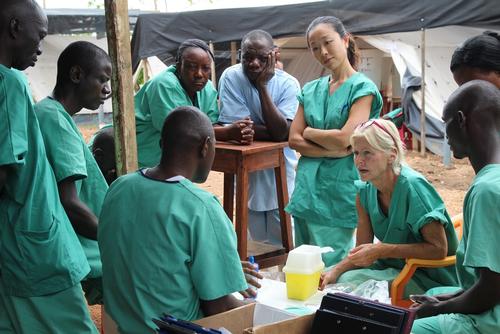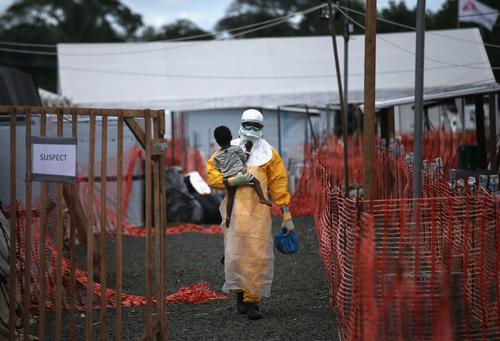Global overview
Since the Ebola outbreak in West Africa was officially declared on 22 March in Guinea, it has claimed 2,811 lives. The outbreak is the largest ever, and is currently affecting five countries: Guinea, Liberia, Nigeria, Sierra Leone and Senegal.
After repeated calls from MSF and others, countries like the US, UK, France, China and Cuba have started committing assets and personnel to the affected region. To this date, very little has materialised in concrete action on the ground. MSF is continuing its strong advocacy to mobilise states including a strong speech at the Security Council on the 18th September as a resolution to fight Ebola was unanimously voted.
MSF teams in West Africa are seeing critical gaps in all aspects of the response, including medical care, training of health staff, infection control, contact tracing, epidemiological surveillance, alert and referral systems, community education and mobilisation.
MSF has been responding to the outbreak since March, and currently has a total of 3,058 staff working in Guinea, Liberia, Nigeria, Sierra Leone and Senegal, treating a rapidly increasing number of patients.
Operational highlights
MSF’s West Africa Ebola response started in March and now counts activities in five countries: Guinea, Liberia, Nigeria, Senegal and Sierra Leone. MSF currently employs 248 international and 2,800 locally hired staff in the region. The organisation operates six Ebola management centres providing a total of 549 hospital beds in isolation. Since the beginning of the outbreak, MSF has admitted 3,299 patients, among whom 2,051 were confirmed cased of Ebola, and 650 have survived. More than 553 tonnes of supplies have been shipped to the affected countries since March. As things stand, the estimated budget for MSF’s activities until the end of 2014 is 46.5 million euros.
Guinea
Although more stable than in neighbouring countries, the Epidemic is still not under control in Guinea. Suspected cases were reported in new districts like Kindia, close to Conakry, and Lola, near the border of Ivory Cost. A suspected case was also notified from Beyla in Guinée forestière.
MSF faced an increase of cases in Conakry linked to a transmission chain in town, however Gueckédou remains stable with an average of 40 confirmed case in the Ebola centre.
Since 10 days ago a small permanent team is based in Macenta to manage the transfers from the transit Centre to Gueckédou. Several confirmed community death cases were reported in and around Macenta. The epidemiological situation of the area remains complex and difficult to grasp.
Liberia
The number of people who have Ebola in Monrovia is still rising. Every day there are large numbers of people arriving at MSF's ELWA Ebola centre but not all of them can be accepted. Our team is still having to turn people away. This week a new 120 bed clinic opened up in the city, the Island clinic, which is run by the Ministry of Health and the WHO. As soon as the clinic opened it was full. The clinic takes the number of beds in the city up to 360.
Even though we can offer only basic medical care in the centre, the number of survivors has now passed 140. Our youngest-ever survivor, James, 3, discharged on Monday. He had been cared for inside the centre by his uncle, Dominic, who was also one of our survivors.
In the next few days, mass distribution of MSF's family protection and home disinfection kits should start, which will target neighbourhoods which have reported large numbers of cases. The kits are not designed to allow people to provide home based care, but give them a chance to protect themselves should a family member become ill, and also allow people to disinfect their homes to cut the risk of transmission. The full distribution of the 50,000 kits will take between six weeks to two month.
In the north of the country, in Lofa county, MSF continues to operate a 100-bed Ebola management centre in Foya. The situation changes every day and as of 24 September, MSF had around 19 patients in isolation. Almost all patients come from Lofa County, mainly from Foya, Kolahun and Voinjama districts, with a few travelling from Zorzor District and Bong County.
Counselling activities for staff were recently started thanks to the arrival of a mental health team. MSF is also providing counselling for patients and their relatives. We are also discussing how we can help to provide support to negative discharged patients, as well as recovered patients, who often face discrimination in the local community.
Twenty six percent of patients in Foya are children (0-14 years). A few recovered patients have recently volunteered to support and play with the children while they are in care, which is having a very positive impact on their mental health
Sierra Leone
MSF’s Ebola management centre in Bo opened on 19 September and at last count had admitted 15 patients, 11 of who were confirmed cases.
In Sierra Leone the government set a three-day house to house mobilisation campaign aimed at containing the Ebola outbreak over the weekend. MSF has not received a marked increase in patients. Across the country there were 130 cases found, but in Kailahun MSF received 28 patients in one day.
In Kailahun, MSF continues to see a large number of patients coming from Makeni. There is a shortage of MoH ambulances meaning that up to 10 patients are travelling for half a day in cramped and deplorable conditions. As a result, some patients have been dead on arrival.
Nigeria
MSF is providing technical support to Nigerian health authorities in Lagos and Port Harcourt, in areas including isolation, contact tracing, training and public education. Since the outbreak began, there have been 15 confirmed cases in Lagos and 4 in Port Harcourt. Currently there are no patients in isolation centres and the majority of the contacts completed the first 21 days follow-up, both in Lagos and Port Harcourt. The outbreak could be declared officially over by the 20th of October.
Senegal
MSF will continue providing technical support to Senegalese health authorities, after the only patient was discharged last week. All his contacts have been controlled for 21 days without alerts.
Democratic Republic of Congo
The current outbreak in DRC’s Equateur province is unrelated to the one in West Africa. Some 50 MSF staff have been deployed to Lokolia and Boende in response to the outbreak, and teams are running two treatment centres, one with 40 beds, the other with 10 beds. So far, 35 people have been admitted at the two facilities. 11 deaths have been reported, 19 people have been confirmed with the disease and 5 have recovered.
MSF activities

| Guinea | 2 | Conakry, Guéckédou |
| Liberia | 2 | Monrovia, Foya |
| Sierra Leone | 2 | Kailahun, Bo |
| Total | 6 |
MSF staff on ground (as of 23 Sept)
- Guinea: 46 international, around 350 national (+ MoH)
- Sierra Leone: 88 international, around 1,150 national
- Liberia: 62 international, around 800 national + Lofa: 41 international, 466 national
- Nigeria: 6 international
- Senegal: 5 international
TOTAL: 258 international and 2,800 national = 3,048staff
Supplies sent to West Africa since beginning of Ebola response:
553 tonnes of cargo.
Admissions per treatment facility
| Date of info | Admissions since start of activities* | Confirmed | Recovered | |
| Guinea | ||||
| Conakry | 22 Sept | 495 | 176 | 91 |
| Guéckédou | 22 Sept | 809 | 454 | 158 |
| Sierra Leone | ||||
| Bo | 22 Sept | 12 | 11 | 1 |
| Kailahun | 22 Sept | 606 | 391 | 140 |
| Liberia | ||||
| Foya | 21 Sept | 614 | 346 | 119 |
| Monrovia ( ELWA 3) | 21 Sept | 763 | 673 | 141 |
| Total | 3,299 | 2,051 | 650 |
* admissions include all suspected, probable and confirmed cases. Anyone who is admitted is lab tested which can take 1-2 days for results to come back. If they are negative, they are discharged. So the total admissions includes people who are currently waiting for lab confirmation and people who never had Ebola but had symptoms and were therefore admitted to the suspected ward.





